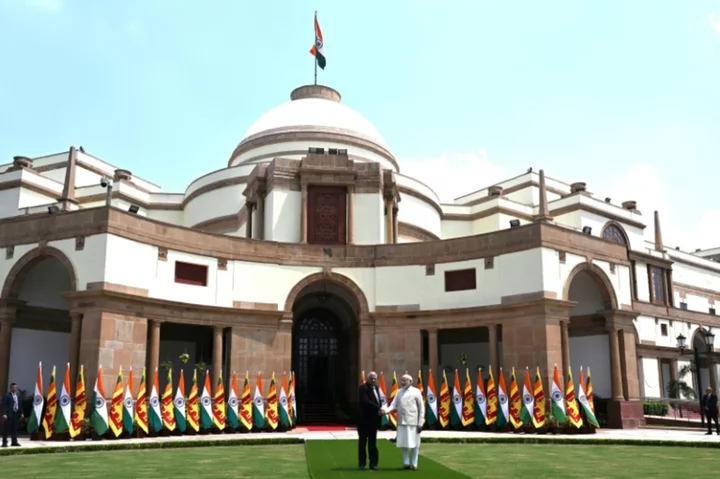India and Sri Lanka agreed Friday to consider building a land link between them, they said during President Ranil Wickremesinghe's first visit to the regional powerhouse, as Chinese influence grows on his island.
Establishing "land connectivity" across the Palk Strait, which in places is only around 25 kilometres (15 miles) wide, would give India access to the key ports of Trincomalee and Colombo and strengthen a "millennia-old relationship", the neighbours said in a strategic document.
Feasibility studies on a land bridge and a petroleum pipeline will be carried out, Indian Prime Minister Narendra Modi said after their talks.
Wickremesinghe's two-day visit came a year after he became president following the toppling of his predecessor during an unprecedented economic crisis.
As Sri Lanka saw daily street protests over shortages of food, fuel and medicines, India poured in nearly $4 billion in aid, despite Colombo defaulting on its $46 billion in foreign debt.
"Sri Lanka faced many challenges last year but like a close friend we stood shoulder to shoulder with the people of Sri Lanka in the time of crisis," Modi said.
In the discussions, New Delhi also raised concerns about the "Chinese presence" in Sri Lanka, said India's foreign secretary Vinay Kwatra.
India considers Sri Lanka part of its backyard and officials have been alarmed by Beijing's activities on the island and in the wider region.
China is Sri Lanka's biggest bilateral creditor and a Chinese firm acquired a 99-year lease on the southern port of Hambantota after Colombo was unable to repay a huge loan from Beijing to build it.
A $1.4 billion land reclamation project next to Colombo port -- the biggest-ever foreign investment in Sri Lanka -- has raised Indian fears that Beijing could use it as a listening post.
Initially some of it was to have been Chinese sovereign territory.
The island lies halfway along the main international shipping route between Europe and East Asia, with Colombo and Hambantota the only deep sea ports between Dubai and Singapore.
As part of its Belt and Road Initiative, China has also struck infrastructure deals with countries around the Indian Ocean, including the Maldives, Bangladesh and Djibouti, where it has a military base.
Security concerns were raised in India last year over a port call in Hambantota by a Chinese research vessel, Yuan Wang 5, which New Delhi describes as a spy ship.
"The Sri Lankan side did convey to us their sensitivity and respect for our security and strategic concerns relating to what happens in our maritime domain," Kwatra said at a press briefing.
Among other projects in the strategic document, Wickremesinghe said the petroleum pipeline between the two countries "will ensure an affordable and reliable supply of energy to Sri Lanka".
abh/slb/dva









